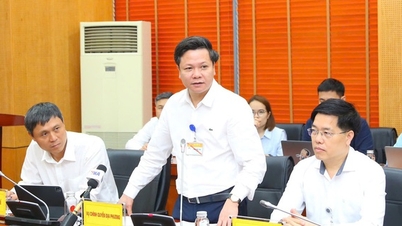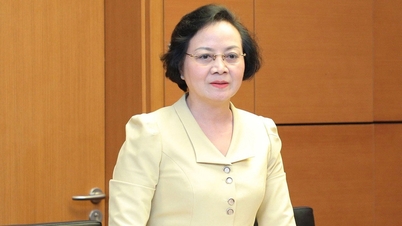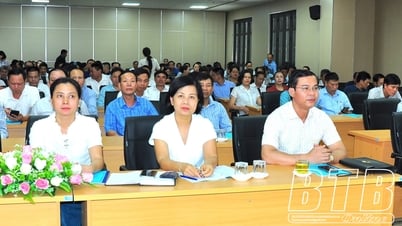Minister of Home Affairs Pham Thi Thanh Tra has just made a supplementary report clarifying a number of issues in the implementation of the National Assembly's resolution on thematic supervision and questioning since the beginning of the 15th National Assembly's term in the field of home affairs, including salary reform.
The report is intended to serve the questioning session at the 6th session of the 15th National Assembly starting tomorrow morning, November 6.
Adequate resources have been allocated for salary reform.

Minister of Home Affairs Pham Thi Thanh Tra
The Minister of Home Affairs said that implementing Resolution 27 of 2018 on salary reform, the Government reported to the Central Committee at the 8th Central Committee Conference, then reported to the National Assembly at the 6th session on the results and roadmap for reforming salary policies for cadres, civil servants, public employees, armed forces and employees in enterprises.
Ms. Tra said that the salary reform has two major advantages: sufficient budget resources have been allocated to synchronously implement all 6 contents of the new salary regime according to Resolution 27.
At the same time, ensure that the lowest wage in the public sector is equal to the average lowest wage in the business sector.
Another advantage is that up to now, the state administrative apparatus at the Central level has reduced 17 general departments and equivalent organizations; reduced 8 departments and 145 departments/committees under general departments and ministries.
At the local level, 7 departments and 6 other administrative organizations under the provincial People's Committee were reduced; 2,572 department-level organizations and equivalent; 7,732 public service units were reduced; 8 district-level administrative units and 563 commune-level administrative units were reduced.
At the same time, the number of civil servants reduced by 10.01%, the number of public employees receiving salaries from the state budget reduced by 11.67%, which is the basis for creating resources to implement salary policy reform.
Job position system for salary reform is not finished
The report of Minister of Home Affairs Pham Thi Thanh Tra devoted more space to reflecting the difficulties of salary reform.
According to Minister Tra, the first difficulty is also budget allocation. Accordingly, Resolution 27 has determined to reform the salary policy from 2021. However, due to the difficult economic context of the world and Vietnam, especially the severe impact of the Covid-19 pandemic, it is difficult to allocate state budget resources to implement the salary reform policy.
Next, the construction and completion of the system of job positions for cadres, civil servants and public employees in the political system "is a fundamental solution with a premise for implementing salary reform" as a basis for building a new salary table "still in the process of completion".
Ms. Tra said that some legal documents to institutionalize the Central Committee's resolutions related to salary reform have been slow to be implemented. Guidance on implementing the autonomy mechanism for public service units has not been timely and consistent. Not to mention that promoting the socialization of public service units to reduce the number of people receiving salaries from the state budget has not met the set requirements.
Another difficulty that Ms. Tra mentioned is that the implementation of transferring old salary to new salary for leaders is complicated because many old salary levels, ranks, and different job titles are classified into a new salary level... leading to some people being higher, some being lower (the difference must be kept to equal the current salary).
Referring to the solution to implement a synchronous salary policy reform from July 1, 2024, the Minister of Home Affairs said that the first solution is to submit to competent authorities for approval a list of job positions for cadres, civil servants, and public employees in the political system from the central to the communal level.
Ms. Tra also said that she will focus on implementing the Resolution of the 6th session of the 15th National Assembly on reforming salary policy immediately after it is approved by the National Assembly.
Third is to implement financial solutions to create resources to ensure sustainable wage policy reform; develop regulations on new wage management mechanisms for construction areas for consideration and decision by competent authorities.
Do not take advantage of salary increases to increase prices.
Ms. Tra also mentioned the solution to continue streamlining the organizational structure, reducing staff and reducing the number of people receiving salaries and allowances from the state budget; restructuring the team of cadres, civil servants and public employees according to job positions, titles and leadership positions as a basis for implementing the new salary regime.
The Minister of Home Affairs also emphasized the need to step up information and propaganda work to create social consensus on reforming wage policies; especially not to take advantage of wage increases to increase prices, causing market imbalance.
"After the competent authority approves the roadmap for reforming the salary policy and the specific contents of the new salary regime, the Ministry of Home Affairs will advise the Government to issue a decree on the new salary regime for subjects under the Government's authority. At the same time, coordinate with the Central Organizing Committee to submit to the Secretariat a decision on the new salary regime for the Party, the Fatherland Front and socio-political organizations; coordinate with the Delegation Work Committee to submit to the National Assembly Standing Committee a resolution on the new salary regime for subjects under the management authority of the National Assembly and the National Assembly Standing Committee," Minister Pham Thi Thanh Tra reported to the National Assembly.
Source link



![[Photo] General Secretary concludes visit to Azerbaijan, departs for visit to Russian Federation](https://vphoto.vietnam.vn/thumb/1200x675/vietnam/resource/IMAGE/2025/5/8/7a135ad280314b66917ad278ce0e26fa)

![[Photo] President Luong Cuong presents the decision to appoint Deputy Head of the Office of the President](https://vphoto.vietnam.vn/thumb/1200x675/vietnam/resource/IMAGE/2025/5/8/501f8ee192f3476ab9f7579c57b423ad)
![[Photo] National Assembly Chairman Tran Thanh Man chairs the meeting of the Subcommittee on Documents of the First National Assembly Party Congress](https://vphoto.vietnam.vn/thumb/1200x675/vietnam/resource/IMAGE/2025/5/8/72b19a73d94a4affab411fd8c87f4f8d)
![[Photo] Prime Minister Pham Minh Chinh meets with the Policy Advisory Council on Private Economic Development](https://vphoto.vietnam.vn/thumb/1200x675/vietnam/resource/IMAGE/2025/5/8/387da60b85cc489ab2aed8442fc3b14a)

























































![[Photo] Prime Minister Pham Minh Chinh talks on the phone with Singaporean Prime Minister Lawrence Wong](https://vphoto.vietnam.vn/thumb/402x226/vietnam/resource/IMAGE/2025/5/8/e2eab082d9bc4fc4a360b28fa0ab94de)

































Comment (0)